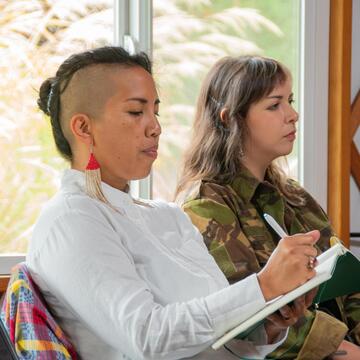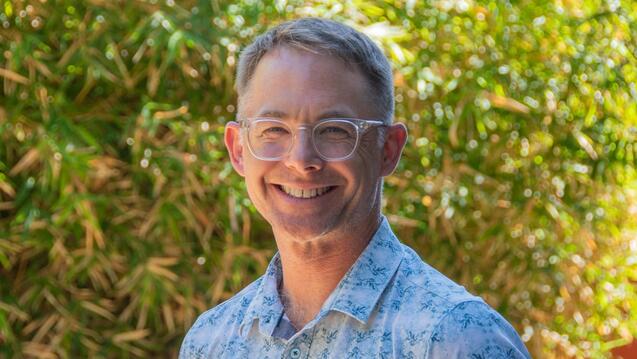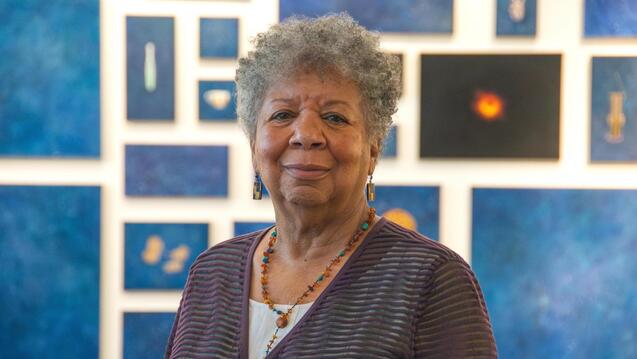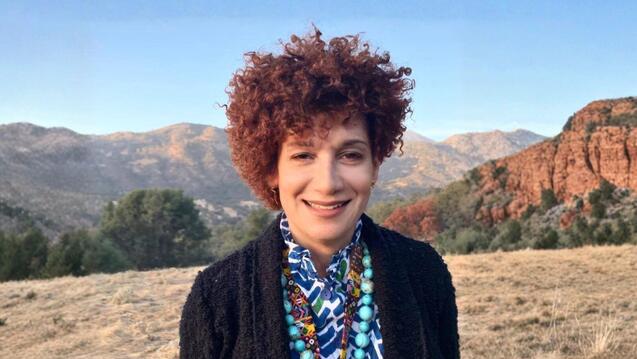Professor Phil Weglarz leads CIIS' Expressive Arts Therapy program, preparing students to integrate creative modalities into mental health services and community transformation.

Creating Change through Human Sexuality Studies with Michelle Marzullo
Explore how CIIS’ Human Sexuality degrees empower students to create social change through research, theory, and advocacy.
Michelle Marzullo, chair of the Department of Human Sexuality at CIIS, is a renowned educator, social scientist, and consistent advocate for LGBTQIA+ rights. She bridges academia and activism, applying a critical sexuality studies lens to explore the complex relationships between power, sexuality, sex, and gender. Beyond academia, Dr. Marzullo contributes to public health and organizational change through her research and consultancy work.
CIIS offers two graduate programs, an M.S. in Critical Sexuality Studies and only the second accredited Human Sexuality Ph.D. program in the U.S., both rooted in critical, intersectional studies of sex, sexual expression, and identity to promote positive social change. In this interview, Dr. Marzullo shares why this field is essential to our understanding of power and freedom and celebrates the diverse, passionate students who make up these close-knit academic communities.
Can you share what makes the Human Sexuality program an important program for students to consider?
Our Human Sexuality programs are especially important right now. There is a movement to control women's bodies and to roll back the gains made by social movements over the last 30 to 40 years. I'm talking about women, who are 50% of the world’s population, but also people of color, transgender, lesbian, gay, bisexual people, and anyone who doesn't fit a narrow idea of what “should be” normal sexuality or gender, whatever that means where they are. Our program directly addresses this and is training critical thinkers who are working to push back against these attacks on reproductive freedom and basic human rights in our society.
It's urgent that we create more thought leaders around issues of sexuality and gender. So many rights are being attacked and reversed. Some are obvious, like the fall of Roe v. Wade, but others, like the right to marry or for BIPOC communities to enjoy fundamental privileges, are also at risk. Our program uses a critical sexuality studies lens, which trains students to understand sexuality and gender within matrices of power. That's why this work is so urgent and so necessary.
Can you share about the format of the program?
The Human Sexuality doctoral program is a hybrid program. Most of the teaching is online, with four-day intensives six times a year, with the first and last being at our San Francisco-based campus, and the other four held via Zoom. These intensives are the highlight of the program, as they allow professors and students to get to know each other in person. It really creates a wonderful bonding experience. Our cohorts are small, and we’ve witnessed how spending this time together creates bonds that carry doctoral students through the learning and research phase as a community of scholar-practitioners and sexuality changemakers.
Our program faculty focus on close mentoring and creating a cohesive cohort experience. Our students start the program only during fall semesters, and they move together through the entire experience. By the time they reach their dissertation or capstone phase, they’ve developed a solid support network made up of their professors and also each other — for accountability, engagement, academic debate, and encouragement. I consider this one of the greatest strengths of our program.
What kinds of students are part of the Human Sexuality programs?
Students who are attracted to our program see a need for change. They might be mid-career professionals, therapists, or people who have recently come to a deeper realization about sexuality, whether their own, their children's, the people around them, and they recognize that there is a problem or question that needs addressing. They come here ready to deeply engage in a years-long research study on it.
I mentioned earlier that we are creating a community of scholar-practitioners. This means our program supports those interested in making change through close evidence-based research work, which we train them to do. We then encourage them to apply their knowledge and skills to do timely, impactful work that takes the best of what we know now and applies it to solve real-world problems on sexuality, sex, and related issues. To sum it up, our program teaches people how to solve problems and push conversations forward by using research, methodology, and theoretical training to allow them to produce evidence-based research to make change.
Some recent examples of the work that our faculty and students have produced through this scholar-practitioner model are:
- Professor Katharina Azim’s article published with our doctoral students: "Medical gendered racism and Black women's experiences of genito-pelvic pain/penetration disorder in the USA - A conceptual exploration"
- Alum Clarissa Francis' book, based on her dissertation: Black Women’s Bodily Autonomy, Sexual Freedom, and Pleasure
- Dr. Elliott Kronenfeld's book, based on his dissertation: Unspoken Loss: Men, Infidelity, and Disenfranchised Grief
- The book I coedited with William Leap, focused on understanding how we talk about sexuality from a critical perspective and why that matters: Critical Sexuality Studies, Lavender Languages, and Everyday Life
What can you share about the student body in the Human Sexuality programs?
Our program is only one of two human sexuality doctoral programs in the United States. Our student body is so incredibly diverse, largely because we use a framework of critical sexuality studies, which directly teaches students and works alongside students to understand how power impacts sexuality. This framing alone brings in a wide range of students who want to understand sexuality through the lens of race, gender, class, age, religion, geographic location, and historical diversity. They come in knowing they can do that work and knowing they will be seen for who they are: for the diverse individual that each one of our students is.
We have many diverse students. Not only in terms of race and ethnicity, but also in academic disciplines, professional backgrounds, and geographic diversity. We have students from all over the world. More importantly, we have students who demonstrate differences in their thinking based on their experiences in the work, which enriches our program even further.
How are the Human Sexuality programs designed?
The Human Sexuality doctoral program is designed to produce rigorous social science researchers, scholars, and thought leaders using evidence-based research. Our program is different from other programs in sexuality studies in that we train our students to use evidence, close reasoning, high theory, and research methodology, to answer some of the most vexing questions in critical sexuality studies today.
What is unique about this program compared to others?
What sets our program apart is its foundation in critical sexuality studies, which means we place the question of power at the center of our students’ training. You won't get a version of sexuality studies here that only looks at the body, for instance, or focuses solely on heterosexuality, both common critiques of other programs. Instead, our program starts with the idea that everyone who has sexuality experiences it within matrices of power. We teach our students to understand how power shapes us, starting from the most intimate decisions we make, like: Who should I marry? Should I listen to my desires? Should I have children?
We help students unpack how those personal intimacies are reflected in public spaces: in communities, in media, in politics. How does the media talk about sexuality? How do politicians? How do we, as a culture, think about sexuality in public discourse, even though these experiences come from such private, intimate places?
Our students explore these questions through theorists, scientific articles, close discussion, and nuanced, historical context. By focusing on questions of power, we help students understand sexuality from both cultural and embodied perspectives, as biological and as sociocultural.
Human sexuality as a topic is integral. It is about the body. It is about how the body responds to its environment. It's about how we, as individuals, see ourselves in different identities, understand our desires, and how that comes through in our relationships, in our community engagements, in the ways that we build our families. Sexuality studies is integrative, and the way that we teach it is integrative. We draw on multiple disciplines, multiple fields, and we make sure that the theory we use comes from various places in the academy, across fields and disciplines. We do the same with our methodology training. It is both quantitative and qualitative.
How do the Human Sexuality programs equip students?
Students can use their research degree to engage in various kinds of research studies. They can also use this degree for thought leadership, such as creating content, writing books, engaging in advocacy, though not necessarily from a political point of view. They’re scholars: they're well-read, they understand the nuance and timeliness of topics, and they're articulate around these issues — this is what we mean by critical.
We use the scholar-practitioner model to empower our students to produce timely, impactful work that responds to urgent and evolving societal needs. Our students are doing research that mirrors the urgency of the everyday on these issues, especially in an age when reproductive freedoms and connected freedoms are in question.
How do you see students transform?
Our students transform in ways that are unique to their own experiences over the time we teach them. They come in curious, able to do the work, but some may be a bit timid or some determined to make their own point. They're coming from lots of different backgrounds, both personally and professionally. They're learning an absolutely new language, a new way to see the world, a new way to think about the world. By the second semester I see major change. They become more comfortable, conversant in the language we use in sexuality studies. They start to recognize words like deconstruction, interpolation, and hegemony. Most importantly, they begin to understand how to conceptualize integral connections between sexuality, individuals, and society.
Some of the best stories are about the therapists who come into our program. They immediately start using what they're learning to be better for their clients, to really start applying the theories, test them out, and guide clients in a way that is more open-minded. The change is dramatic.
What kinds of feedback do you get from students?
The feedback I hear from students going through the program is, “It's challenging, it's rigorous, and I love it.” What students start to realize, even in just the first semester, is that we're giving them a language to understand phenomena they've been witnessing but haven’t had the words or concepts to describe. We're giving them tools to interpret the social worlds of sexuality, sex, sexual response, and gender. There is so much gratitude after our academic residencies, which is so deeply satisfying for myself and our faculty.
What can you share about Human Sexuality faculty?
Our faculty work as an ensemble to teach our students, by design. We’ve assembled a team that can work across disciplines and fields. We have, on faculty, an applied anthropologist (that's me), a sociologist, a social psychologist, an educational psychologist, someone trained as an Ed.D./Ph.D. in education, and a physician. Between all of us, if you're talking about “integral,” our Human Sexuality Studies program is integral by the very design of our faculty and the knowledge we bring to train our students.
Faculty in our program teach from a place of passion, from a place of knowing the challenges of doing research on sexuality, and doing it anyway. I think the most important thing to remember is that CIIS allows us to do this work here. It is not afraid of this work. Our faculty are so grateful for that, because it’s incredibly difficult to find institutions that are supportive, open-minded when you're asking questions about sexuality and power in today’s world. CIIS fundamentally supports us, and for that we're eternally grateful.
What can you share about the field of Human Sexuality?
Sexuality studies is not a new field. But when people come to our program, they often say, “Isn't it great to have a new field of sexuality studies?” The reason it feels new is because talk about sexuality is often squelched. It tends to be seen as a challenge to someone or something. Especially in academic settings, it's very difficult to create a program around this. You have to convince the powers that be that a program like this, which is challenging from the start, is important, relevant, timely, and necessary.
For the generations before mine, doing sexuality studies meant doing it in the shadows. It meant risking your academic reputation. People didn't just think it was unnecessary, they thought it was threatening. Our faculty is grounded in the experiences of those generations of scholars. CIIS creates an explicit space for us to think deeply about sexuality studies in a way that hasn't been acceptable at many institutions. In fact, many institutions have shut down their sexuality studies programs because they feel threatened by their mere existence. At CIIS, the institution takes the challenge to support us. They take the risk, and through that risk and the innovation it enables, we are making change.
Do you have any advice for students who are interested in applying?
A piece of advice for students working on their applications: make sure your passion, your focus, and even some of your personal history come through. Show us what you're interested in studying and the kinds of changes you hope to make with your degree.
Each of our students who take on a research project is innovating. To complete a dissertation or master’s capstone is to create new knowledge or approaches to solving crucial problems. Of course, no knowledge is entirely new, it builds on what we already know, but our program is, by definition, innovative. It’s what we do. Students need to show us how they intend to make positive social change through that work.
Read more about Michelle Marzullo’s writing, research, and talks.

Human Sexuality
Grounded, contextual engagement with current issues in sexuality to drive positive change
Related News
The Division of Community Engagement and Belonging highlights the work of Shirley Strong, Beloved Community Consultant and Former CIIS Dean of Students.
Professor Mimi Savage introduces CIIS' new Expressive Arts Coaching & Community Building master's program, designed for artists and coaches seeking to support transformation through creativity.



